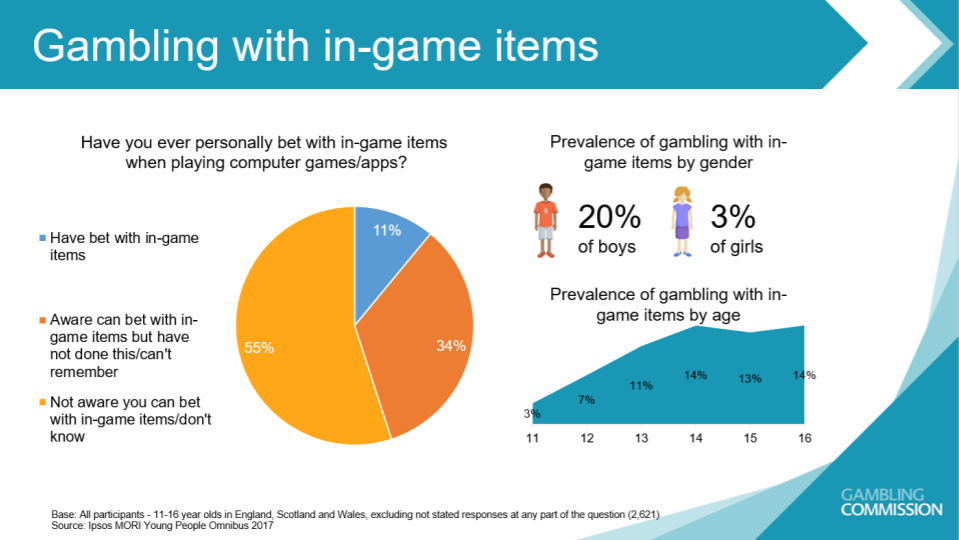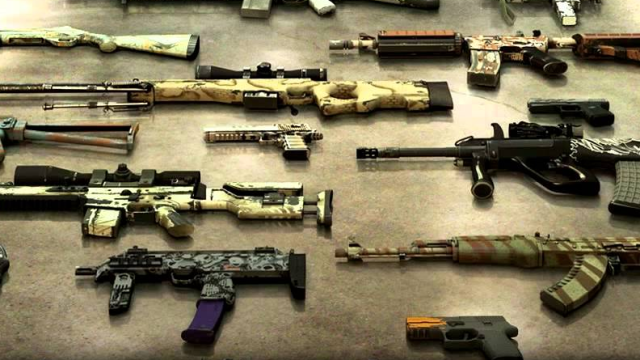The UK Gambling Commission released its annual report today examining the gambling habits of 11- to 16-year-olds. For the first time ever, betting on in-game items such as skins was included in its analysis.
The report, titled “Young people and gambling 2017”, states that 11 per cent of children between between 11 and 16 had bet with in-game items while playing computer or app-based games at some point in their lives. Surveying a population of 2803, the report also found that of that 11 per cent, just over half had done so in the prior month. In addition, gambling with things such as skins was much more common among boys (20 per cent reported trying it) than girls (only three per cent). Age was also a strong predictor, with only three per cent of 11-year-olds reporting having gambled with in-game items compared to 14 per cent of 14- to 16-year-olds.
The five to six per cent of children who had gambled with skins online in the previous month compares to about 11 per cent who had gambled just the previous week on things such as private bets with friends and lottery scratchcards (something that’s technically illegal). That puts gambling with skins and other cosmetics in the ballpark of how often children in the survey admitted to playing some form of physical slot machine in the previous week.

Four years ago, one of these kids would have been Ryan Archer, a Bangor University student who began betting with skins in games like Counter-Strike: Global Offensive when he was just 15. In relation to the Commission’s findings, the BBC reported he’s lost more than £GB2000 ($3523) through skin gambling since he started.
Last month Kotaku reported on a similar story revolving around a redditor known as Kensgold, a 19-year-old who spent over $US10,000 ($13,273) on microtransactions in recent years. A big part of that included gambling on CS:GO skins, something he didn’t see as problematic at the time but recently put a stop to after finally addressing his addiction with a therapist. Despite attempts by Steam and other game publishers to crack down on the gambling that takes place around their games, CS:GO and now even PlayerUnknown’s Battlegrounds still see a lot of action in third-party markets where players can bet items they have already collected on the chance to win others.
“The Gambling Commission takes the view that the ability to convert in-game items to cash, or to trade them (for other items of value) means they attain a real-world value and become articles of money or money’s worth,” the report states. In a position paper from last March, the Commission argued by this same logic that betting with virtual items should be regulated in the same ways as any other type of gambling, with companies that facilitate it needing to have gambling licenses in order to do so. That’s why, unlike in previous years, the organisation has decided to start including questions about skin gambling in its annual survey.
“Because of these unlicensed skin betting sites, the safeguards that exist are not being applied and we’re seeing examples of really young people, 11 and 12-year-olds, who are getting involved in skin betting, not realising that it’s gambling,” Sarah Harrison, the commission’s chief executive, told the BBC.
The agency’s biggest concern is less about the amount of money being spent on video game-based gambling (Archer and Kensgold’s cases remain outliers) but what their effects might be on normalising gambling for younger kids.

Comments
3 responses to “Survey Finds Kids As Young As 11 Years Old Have Gambled With In-Game Items ”
Here comes that regulation we all knew was on the way.
You know it’s a weird day when gamers and politicians are on the same side
This is why loot boxes are a problem. Do you really want to be a person that is supporting a platform that is encouraging kids to gamble and creating a potential long life addiction?